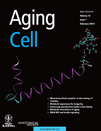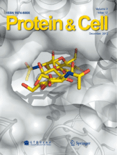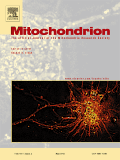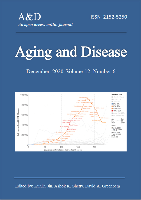
AGING CELL
Scope & Guideline
Advancing Knowledge on Cellular Aging Mechanisms
Introduction
Aims and Scopes
- Cellular and Molecular Mechanisms of Aging:
Research that investigates the fundamental biological processes underlying aging at the cellular and molecular levels, including studies on cellular senescence, oxidative stress, and mitochondrial dysfunction. - Age-Related Diseases and Healthspan:
Studies that focus on the relationship between aging and various diseases, such as neurodegenerative disorders, cardiovascular diseases, and metabolic syndromes, aiming to understand how aging influences disease progression and healthspan. - Therapeutic Interventions and Aging:
Research exploring potential therapeutic strategies aimed at mitigating the effects of aging and promoting healthy longevity, including pharmacological interventions, dietary modifications, and lifestyle changes. - Genetics and Epigenetics of Aging:
Investigations into genetic and epigenetic factors that influence aging and longevity, including studies on genetic variations associated with age-related traits and epigenetic modifications. - Model Organisms in Aging Research:
Utilization of various model organisms, such as mice, worms, and primates, to study the biological mechanisms of aging and test potential interventions.
Trending and Emerging
- Cellular Senescence and the Senescence-Associated Secretory Phenotype (SASP):
Research on cellular senescence, particularly the SASP, is increasingly prominent, focusing on how senescent cells contribute to aging and age-related diseases through inflammatory and tissue remodeling processes. - Microbiome and Aging:
Emerging studies are exploring the relationship between the gut microbiome and aging, emphasizing how microbial composition and metabolites can influence healthspan and longevity. - Nutritional Interventions and Metabolism:
There is a growing emphasis on the impact of dietary factors and metabolic pathways on aging, with research investigating caloric restriction, specific nutrient supplementation, and dietary patterns that promote healthy aging. - Epigenetics and Aging:
The field is seeing an increase in studies focusing on epigenetic modifications and their role in aging, including how environmental factors and lifestyle choices can influence epigenetic aging. - Regenerative Medicine and Stem Cell Research:
Research related to the use of stem cells and regenerative therapies to combat age-related degeneration and improve tissue repair is gaining traction, reflecting a broader interest in rejuvenation strategies.
Declining or Waning
- Traditional Pharmacological Interventions:
Research on conventional pharmacological treatments for aging-related conditions appears to be waning, as there is a growing interest in exploring novel approaches and integrative therapies. - Single-Factor Studies in Aging:
The focus on studies that examine a single factor in aging, such as a specific protein or gene, is decreasing, with a shift towards more complex, multi-factorial approaches that consider the interplay of various biological systems. - Non-Mechanistic Observational Studies:
There is a decline in purely observational studies that do not delve into the mechanisms of aging, as the journal increasingly favors research that provides insights into underlying biological processes.
Similar Journals

GeroScience
Exploring Innovations in Age ResearchGeroScience, published by Springer, is an esteemed open-access journal that focuses on the multidisciplinary field of aging research. Since its inception in 2017, the journal has quickly established itself as a leader in its field, achieving impressive Q1 quartile rankings across various categories, including Aging, Cardiology and Cardiovascular Medicine, Geriatrics and Gerontology, and Complementary and Alternative Medicine, as per 2023 evaluations. With a significant impact factor that underscores its influence and reach in academia, GeroScience aims to disseminate high-quality research that addresses the complex challenges and advancements related to aging. Its accessible publication format fosters greater dissemination of knowledge and encourages collaboration among researchers, practitioners, and students eager to contribute to the growing body of work on age-related health issues. As it continues to thrive, GeroScience remains a pivotal resource for anyone looking to stay at the forefront of aging research.

REJUVENATION RESEARCH
Pioneering Research for a Healthier TomorrowRejuvenation Research is a premier journal dedicated to the advancing field of gerontology and aging research, published by Mary Ann Liebert, Inc. Established in 2000, the journal serves as a pivotal platform for the dissemination of scholarly articles that explore the complex mechanisms of aging and innovative approaches to rejuvenation. With an impact factor reflective of its robust scholarly contributions, the journal currently holds a Q4 ranking in Aging and a Q3 ranking in Geriatrics and Gerontology, showcasing its relevance in the academic community. This periodic publication, welcoming open access submissions, invites researchers, professionals, and students alike to engage with cutting-edge findings that could shape future geriatric practices and enhance quality of life. The journal underscores the importance of interdisciplinary collaboration, encouraging explorations that intersect with biochemistry, genetics, and other vital areas of study. Through its ongoing commitment to high-quality research, Rejuvenation Research remains a critical resource for understanding the biological underpinnings of aging and the strategies to mitigate its effects.

Autophagy
Bridging Fundamental Discoveries with Clinical InsightsAutophagy is a premier peer-reviewed journal published by Taylor & Francis, Inc. in the United States, focusing on advances in the fields of Cell Biology and Molecular Biology. With an impressive impact factor reflected in its Q1 ranking in both categories, Autophagy stands as a vital resource for researchers and professionals dedicated to understanding the intricate mechanisms of cellular degradation and recycling. The journal has been a cornerstone of scientific communication since its inception in 2005, continuing to flourish through 2024, fostering collaboration and innovation in the study of autophagic processes. Although it does not currently offer Open Access options, the journal remains highly regarded for its rigorous peer-review process and its commitment to publishing high-quality, impactful research. By bridging fundamental research with clinical applications, Autophagy plays a crucial role in advancing our understanding of various diseases, making it an essential tool for scholars and practitioners in the biomedical field.

Protein & Cell
Unveiling Innovations in Drug Discovery and BiotechnologyProtein & Cell, published by Oxford University Press, is a distinguished international journal focusing on cutting-edge research in the fields of biochemistry, biotechnology, cell biology, and drug discovery. This open access journal, active since 2014, is dedicated to disseminating innovative findings that advance our understanding of protein functions and cellular processes, making it an essential resource for researchers, professionals, and students alike. With an impressive 2023 impact factor reflected in its Q1 ranking across multiple categories such as Biochemistry, Drug Discovery, and Cell Biology, 'Protein & Cell' stands at the forefront of scientific research, driving collaboration and discussion in the scientific community. Researchers can access the journal freely online, fostering a global exchange of knowledge and contributing to significant advancements in medicine and biotechnology. Located in the United Kingdom, the journal strives to be a pivotal platform for impactful research that influences future studies and applications.

MITOCHONDRION
Illuminating Mitochondrial Roles in BiologyMITOCHONDRION is a distinguished peer-reviewed journal published by Elsevier Science Ltd, focusing on the intricate roles of mitochondria in various biological processes. With an ISSN of 1567-7249 and an E-ISSN of 1872-8278, this journal has carved out a significant niche within the fields of Cell Biology, Molecular Biology, and Molecular Medicine, as evidenced by its Q2 ranking in these categories for 2023. The journal emphasizes the latest research on mitochondrial biogenesis, function, and dynamics, making it a pivotal resource for professionals, researchers, and students engaged in cutting-edge mitochondrial studies. With a robust Scopus ranking, placing it in the top percentiles of its categories, MITOCHONDRION not only advances scientific understanding but also fosters collaboration and innovation within the research community. Though it does not offer Open Access, the journal's comprehensive articles and reviews remain indispensable for those striving to unravel the mysteries of mitochondrial biology. For research spanning from its inception in 2001 through its ongoing commitment to 2024, MITOCHONDRION continues to be a vital platform for disseminating high-quality, impactful research in the realm of mitochondrial science.

Frontiers in Aging
Innovating the Future of Aging ScienceFrontiers in Aging is a leading academic journal published by FRONTIERS MEDIA SA, dedicated to advancing the understanding of the biological processes associated with aging. Established in 2020, this open-access journal aims to bridge the gap between various disciplines including genetics, molecular biology, and physiology, providing a multidisciplinary platform for researchers and clinicians alike. With a notable impact factor denoted by its Q2 quartile rankings in Aging, Genetics, and Molecular Biology, and a Q1 ranking in Physiology as of 2023, the journal is recognized for its contribution to the scientific community. Located in Lausanne, Switzerland, it is committed to promoting open discourse and publishing cutting-edge studies that address the complexities of aging and its implications for health and longevity. The journal’s editorial board, consisting of leading experts, ensures the rigorous peer-review process, maintaining high academic standards and fostering innovation in aging research.

Aging-US
Exploring the Frontiers of Aging and Cell BiologyAging-US is a premier peer-reviewed journal dedicated to advancing the field of aging research and cell biology. Published by IMPACT JOURNALS LLC, this journal serves as a vital resource for researchers and professionals exploring the biological mechanisms of aging and their implications for health and disease. With a commendable impact factor reflected in its 2023 Scopus rankings, where it stands at Rank #10/38 in the category of Aging and Rank #63/285 in Cell Biology, Aging-US exemplifies rigorous scientific excellence. Its open access policy enhances accessibility, fostering a wider dissemination of knowledge in both academic and clinical settings. Spanning from 2009 to 2024, the journal provides a platform for groundbreaking studies and innovative methodologies, ensuring that it remains at the forefront of the dynamic conversations surrounding aging and cellular biology. Engage with Aging-US to contribute to the evolving narratives of longevity and cellular health.

Aging and Disease
Innovating solutions for aging-related challenges.Aging and Disease is a leading open-access journal published by the International Society on Aging and Disease, dedicated to advancing the understanding of aging and its associated diseases. Since its inception in 2010, the journal has established itself as a vital resource for researchers and practitioners in the fields of Geriatrics, Neurology, Cell Biology, and Pathology. With an impressive Q1 ranking across multiple categories and a robust position in Scopus rankings, including ranks in the top 3% in Geriatrics and Gerontology, it showcases high-quality research that addresses the complexities of aging processes. Each issue presents original articles, reviews, and insights aimed at improving health outcomes for the aging population. The open-access model ensures that valuable research findings are readily available to a global audience, fostering collaboration and innovation. As a go-to publication for scholars, healthcare professionals, and students, Aging and Disease significantly contributes to the multidisciplinary dialogue surrounding aging and its health implications.

Nature Aging
Unraveling the Complexities of AgingNature Aging, published by SPRINGERNATURE in Germany, stands as a premier journal dedicated to advancing the field of aging research. With high-ranking performance indicators, including a Q1 classification in Aging, Geriatrics and Gerontology, and Neuroscience (miscellaneous), this journal emphasizes the interdisciplinary nature of aging studies. Its Scopus rankings highlight its impact, achieving remarkable positions such as #1 in Neuroscience and #2 in both Geriatrics and Biochemistry for aging-related research. Although currently not open access, Nature Aging provides a wealth of cutting-edge research and critical reviews that aid researchers and practitioners in understanding the complexities of aging mechanisms and their implications. As the field continues to evolve from 2021 through 2024, this journal not only facilitates the dissemination of knowledge but also fosters innovative discussions that propel the science of aging forward. Join the vibrant community of scholars and professionals dedicated to solving the challenges associated with aging by engaging with the content published in Nature Aging.

npj Aging and Mechanisms of Disease
Unraveling the Secrets of Aging and Diseasenpj Aging and Mechanisms of Disease is a leading open-access journal dedicated to advancing the understanding of the biological mechanisms underlying aging and age-related diseases. Published by NATURE PORTFOLIO in the United Kingdom, this journal has established itself as a vital resource within the fields of Aging and Geriatrics and Gerontology, proudly holding a prestigious Q1 ranking in both categories as of 2023. With an impressive Scopus ranking, placing it in the top 10 for Geriatrics and Gerontology, and the top 9 for Aging, the journal is committed to disseminating high-quality, peer-reviewed research that offers innovative insights and fosters collaboration among researchers and practitioners. Since its inception in 2015, npj Aging and Mechanisms of Disease has embraced the open-access model, ensuring that groundbreaking findings are freely available to all, thereby promoting widespread knowledge-sharing within the scientific community. This journal serves as an essential platform for those seeking to explore the complex interplay of genetic, molecular, and environmental factors that influence aging and its associated challenges.